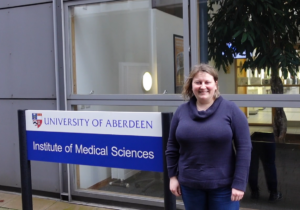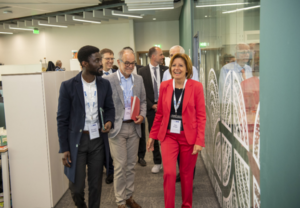Inga Schmidt (University of Aberdeen) on her research on Parkinson's disease along the gut-brain axis

Inga Schmidt is currently a PhD student at the Platt/Riedel group at the University of Aberdeen. The group has a great expertise in disorders of old age, such as Alzheimer’s disease and Parkinson’s disease. Her project focusses on developing new models for Parkinson’s disease to study disease related changes and provide new platforms for novel drug testing. Her project was supported by SULSA Rheinland-Pfalz Collaboration Funding 2022 and she agreed to illustrate her project for us:
Parkinson’s disease is a neurodegenerative disorder, where brain cells die and patients experience motoric impairments, such as an unstable gait and balance problems but can also experience memory loss. We currently do not understand how this disease arises, however recent research shows neurons in the gut can be impaired years before typical Parkinson’s disease symptoms emerge. The disease remains uncurable to this day, with only symptomatic treatments available. This might be partially due to the diversity of the symptoms patients with Parkinson’s disease experience, making it difficult to cater to the different needs of the patient. The symptoms can vary in intensity and some might not be present in cases. Additionally, the survival time after diagnosis can also vary between a few years and decades. We still don’t understand the factors that cause these differences. One hypothesis suggests the protein alpha-synuclein, which tends to aggregate and gains toxic function in Parkinson’s disease might aggregate in different shapes and sizes. This could have an influence on its toxic function and therefore cause differences in the symptoms patients experience.
In my project, I aimed to investigate this hypothesis in a mouse model with the goal to develop a patient-specific model. Firstly, I molecularly screened donated brain tissue from Parkinson’s patients which were kindly provided by the Newcastle Brain Bank and identified tissue with distinct differences in aggregation levels. As a next step, we extracted the aggregated toxic protein from the brain tissue using a gentle method allowing to preserve the aggregate structure. We infused the protein directly into the brains of healthy mice and investigated their behaviour and molecular changes after 6 months. Published literature shows that this infusion can cause a prion-like spread of the toxic protein in the brain of the mice, a mechanism that can also be found in mad cow’s disease. In prion diseases, toxic protein has the ability to turn healthy protein into toxic proteins as well, causing a domino effect that can affect the entire body. Parkinson’s disease is thought to have some properties of a prion disease and in our model the prion-like spread could be confirmed.
During the ongoing mouse study, I was informed that I won the collaboration funding from SULSA and Rhineland-Palatinate that I had applied for together with Stephanie Rommel from the AGENS group at University of Applied Sciences Kaiserslautern, Campus Zweibrücken. Stephanie is also a Parkinson’s disease researcher with expertise in investigating changes in the gut in the context of Parkinson’s disease. The collaboration allowed us to study the gut tissue from my mouse study and exchanges skills and knowledge on the best techniques for the analysis of gut tissue. On the other hand, we could transfer some technical skills for analysing brain tissue from Aberdeen to Zweibrücken as well, allowing Stephanie and her colleagues to add another layer of understanding of their own Parkinson’s models. Preliminary results showed that the toxic protein was present in the neurons in the gut tissue of our mouse model as well, indicating that it can travel outside of the brain and affect the rest of the body.
These initial findings showed us the potential for future collaborations with AGENS in Rhineland-Palatinate and we are hoping to gain further funding to establish a longer collaboration where we can investigate molecular changes in brain and gut in different mouse models and test treatments for Parkinson’s disease.
Read more on the website of the University of Aberdeen
Dr Louis Dwomoh (University of Glasgow): research stay at the Department of Psychiatry and Psychotherapy of the Johannes Gutenberg-University in Mainz

Louis Dwomoh is a PostDoc at the Glasgow’s new Advanced Research Centre (ARC). His research focuses on M1 muscarinic receptor signaling with a special emphasize on identifying and characterizing selective receptor modifiers. His group recently published on drug candidates with a beneficial impact on Alzheimer’s disease in a murine mouse model. To elucidate further the underlying molecular signaling pathways, he applied for a support by SULSA Rheinland-Pfalz Collaboration Funding 2022 together with Prof. Kristina Endres from the University Medical Center Mainz:
Alzheimer’s disease is a progressive neurodegenerative brain disorder that is characterized by disabilities in daily living, memory loss, problems with language and conceptual planning as well as changes in character. While the disease is affecting more than 1 million patients only in Germany and comes along with a high stress burden for both, patients and care givers, treatment options are still limited. Early on, M1 receptors were assumed to play an important role in disease progression; however, side effects due to low specificity of modulators hampered their use in therapeutic approaches. New positive allosteric modulators (M1-PAMs) can circumvent these problematics and are focus of Prof. Andrew Tobin’s (Director of the ARC and Professor of Molecular Pharmacology at the University of Glasgow) and Louis Dwomoh’s research. “Initiated by an online meeting between Rhineland-Palatinate and Scottish researchers, Louis approached me and quickly convinced me that the collaboration funding 2022 is a fantastic opportunity for setting up a new collaboration”, Kristina Endres says. “We planned a project together that allows applying the M1-PAM on brain slices of Alzheimer model mice and brain region-specific collection of tissue for subsequent down-stream analyses. We were quite happy, that the application was granted and Louis visited my laboratory from February to April this year. This project will help to identify molecular pathways that are regulated by the M1-PAM and that contribute to amelioration of pathogenesis or even prevention of Alzheimer’s disease.” Louis Dwomoh’s stay was not only a scientific benefit but also a gain for the complete German working group as this not only provided language training for the undergraduates but also initiated friendships and networking for future projects. During the ongoing project, Dr. Dwomoh was informed that he was additionally granted by the International Exchanges 2022 program of the Royal Society to further support this collaborative project. “This shows how fruitful and effective the exchange between SULSA and Rhineland-Palatinate Universities is already at the first round and we hope to establish long-standing collaborations and a bilateral exchange by this. Inspired by Louis and his narrations, our students are also keen on visiting Scottish research groups in future”, Kristina Endres summarizes this experience.
Here are some links about Dr Dwomoh's research:
https://scholar.google.com/citations?user=xN_yBwoAAAAJ&hl=en&oi=ao
https://www.linkedin.com/in/louis-dwomoh-89301656/?originalSubdomain=uk
https://twitter.com/CellCellPress/status/1488093061959884805/photo/1
